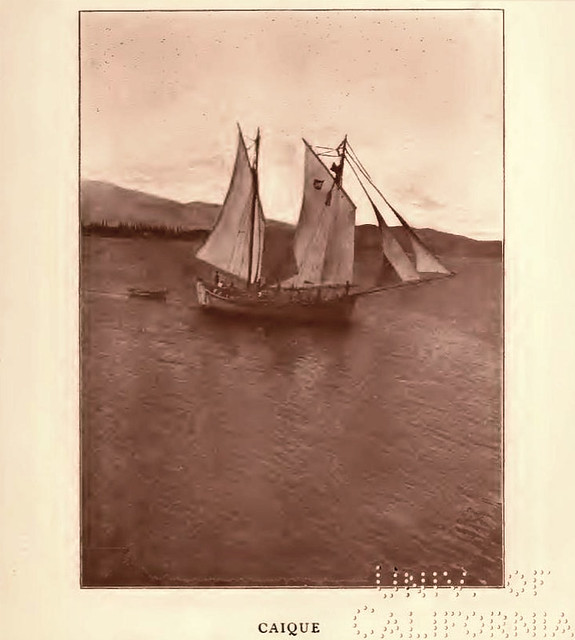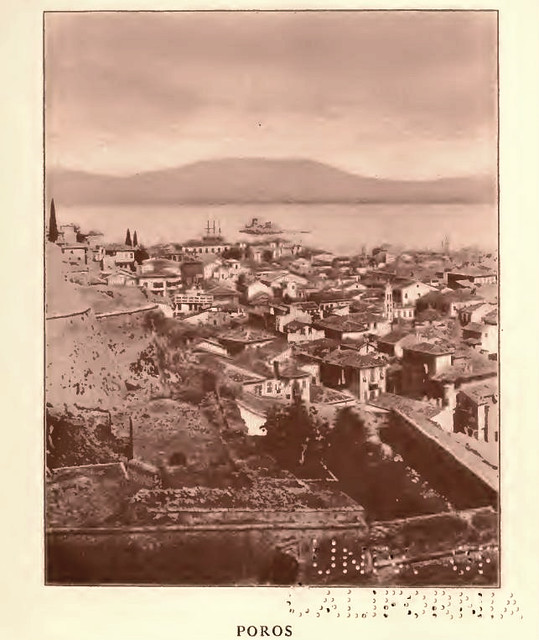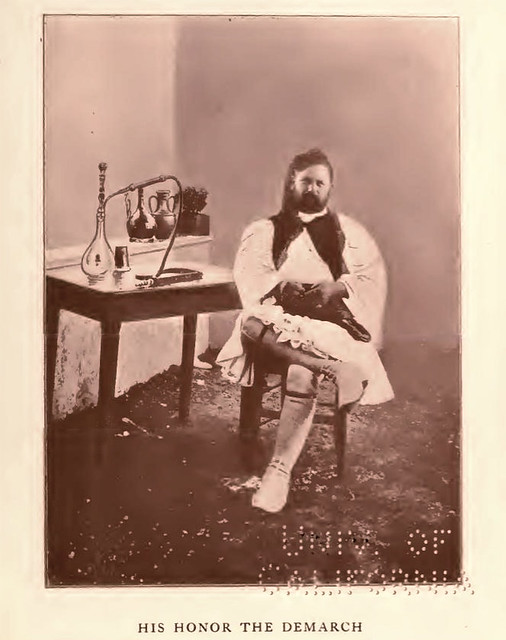47 ~ George Horton: In Argolis
The two immediate causes which sent us to Poros, the first week in March, 1898, were William McKinley, President of the United States, and an innocent three-months-old baby, known to the Greek servants as "the Baby-coula." Now what two things could be more dissimilar in every way? And yet they united to produce just this result.
In Mr. McKinley, exercising his indisputable right, Argolis removed the father from office at a time when the Babycoula was unable to cross the Atlantic; Poros was near to Athens; a good house was obtainable there, and the wild flowers and blossoming trees heralded the approach of early spring. After a family council, in which the Babycoula unconsciously took part by figuring as the chief consideration in every discussion, we decided to leave the Piraeus on a little steamer advertised to sail the next day at two o'clock in the afternoon.
In Mr. McKinley, exercising his indisputable right, Argolis removed the father from office at a time when the Babycoula was unable to cross the Atlantic; Poros was near to Athens; a good house was obtainable there, and the wild flowers and blossoming trees heralded the approach of early spring. After a family council, in which the Babycoula unconsciously took part by figuring as the chief consideration in every discussion, we decided to leave the Piraeus on a little steamer advertised to sail the next day at two o'clock in the afternoon.
[....] We were no strangers in Poros, as we had already passed three summers there. The whole town assembled on the wharf to welcome us, the doctor, the druggist, the postmaster, the mayor, the constable; and a throng of sturdy old fellows in island costume, - red fez, blue knee-breeches incredibly voluminous in the seat, high stockings, wide leather belt containing innumerable pockets and room for a long knife or two. We were greeted on all sides by "Kalos oreesate!" (Welcome !), "Tee kamnete?" (How do you do?), "Kala Eesai? Eesai kala?" (Well, are you? Are you well?), and a continual chorus of "Kala, kala, kala, kala," meaning well, well, well, well, and signifying, even before we had a chance to ask, that our questioners were themselves in good health.
[....] A memorable event marked our first full day in Poros, - a social call from our landlord's wife. She was extremely corpulent, after the style of the majority of Greek women over twenty-five years of age. She had arrayed herself for the occasion in a black silk dress, as befitted the wife of a wealthy landowner; her black hair was neatly plastered over her ears, and she wore about her temples a snuff-colored kerchief, adorned with gorgeous red flowers with blue leaves.
Her first and greatest interest centred in the Babycoula, whom she admired with all manner of extravagant expressions, dutifully offsetting each with the formula "Nameen avoskothees!" (May you not take the evil eye!).
[....] The wedding took place in the afternoon at four, and the proekika or proeka things were carried to the groom's house at nine in the morning of the same day. I assisted at the latter interesting ceremony.
Arriving at the house a few moments before the hour, I found the proekika laid out in state in the humble sitting-room. They consisted of an iron bed with brass knobs, a cherry-colored bureau ornamented with white flowers, bedding, numerous pillows in embroidered silk cases, copper kettles and other kitchen implements, and a trunk filled with the embroidered underwear s and handkerchiefs on which the bride had been working since her earliest childhood. All these articles were decorated with colored ribbons, which the mother enjoined on the friends of Loukas not to lose for their souls' sakes, as they had been borrowed from the neighbors. But the most picturesque objefts of the proekika were the copper implements, polished like cymbals, and of all sizes and shapes, from a huge wash-boiler to a set of long-handled brikas for boiling coffee.
Two long poles had been bound to the bureau by means of ropes, to facilitate transportation.
The friends of Loukas arrived at half-past nine, headed by two musicians with guitar and mandolin. The players had been hired, soul and body, from Friday night till Tuesday morning; and they thrummed the strings incessantly.
[....] A memorable event marked our first full day in Poros, - a social call from our landlord's wife. She was extremely corpulent, after the style of the majority of Greek women over twenty-five years of age. She had arrayed herself for the occasion in a black silk dress, as befitted the wife of a wealthy landowner; her black hair was neatly plastered over her ears, and she wore about her temples a snuff-colored kerchief, adorned with gorgeous red flowers with blue leaves.
Her first and greatest interest centred in the Babycoula, whom she admired with all manner of extravagant expressions, dutifully offsetting each with the formula "Nameen avoskothees!" (May you not take the evil eye!).
[....] The wedding took place in the afternoon at four, and the proekika or proeka things were carried to the groom's house at nine in the morning of the same day. I assisted at the latter interesting ceremony.
Arriving at the house a few moments before the hour, I found the proekika laid out in state in the humble sitting-room. They consisted of an iron bed with brass knobs, a cherry-colored bureau ornamented with white flowers, bedding, numerous pillows in embroidered silk cases, copper kettles and other kitchen implements, and a trunk filled with the embroidered underwear s and handkerchiefs on which the bride had been working since her earliest childhood. All these articles were decorated with colored ribbons, which the mother enjoined on the friends of Loukas not to lose for their souls' sakes, as they had been borrowed from the neighbors. But the most picturesque objefts of the proekika were the copper implements, polished like cymbals, and of all sizes and shapes, from a huge wash-boiler to a set of long-handled brikas for boiling coffee.
Two long poles had been bound to the bureau by means of ropes, to facilitate transportation.
The friends of Loukas arrived at half-past nine, headed by two musicians with guitar and mandolin. The players had been hired, soul and body, from Friday night till Tuesday morning; and they thrummed the strings incessantly.
The friends burst riotously into the house, and a noisy but playful fight over the various articles ensued, each member of the party trying to evince greater zeal than the others. At last the bureau started down the steep whitewashed steps, four men holding the poles; after it came a lubberly boy, triumphantly bearing the wash-boiler, that outgleamed the morning sun; then an indiscriminate mob with pillows, portions of the bed, crockery, more copper implements, and whatever else they could lay their hands on.They knew exactly what to take, for the groom's best man (coumbaros) had been over the night before with the catalogue, and had checked off the things, from the big bureau down to the bride's last embroidered handkerchief. This list had been agreed to by both sides at the time of the matrimonial negotiations; and Loukas and his mother would have been disgraced had a single article been missing.
Down the steep, crooked, narrow streets, the queer procession filed, headed by the music and followed by all the boys in Poros. From white houses perched on the sides of overhanging rocks, confetti rained upon their heads; laughing women crowded little balconies and looked down at them; sailors, sitting in tavern doors in the shade of huge wine-tuns, reviled them merrily ; and an old Greek in a red fez, who sat smoking a narghile under an arbor of vines, tapped merrily on his table with the mouthpiece of his pipe, and hummed the tune of the guitar. They had played that same music fifty years ago, when he was married.
The upper story of Loukas's house overlooked the roof of the house below. Sitting on his rickety balcony, one saw the tiled roofs descending to the sea like the steps in a giant stairway. The site of the town is shaped like a sugar-loaf, and there is not a house in it but commands a stretch of glimmering water and the distant mountains. The streets are crooked, stony, and unspeakably filthy; and numerous narrow alleys and unoccupied yards form convenient dumping-places for dead animals and refuse. And yet vines trail over the rickety balconies, and in every window carefully tended flowers bloom in red earthen pots. Strange people! Strange mixture of a love of the pure and beautiful in nature with utter insensibility to the ugliness of filth and stench!
[....] As the sun stands upon Ortholithi, one of the peaks that compose this giant image, the sea glows a blood red, and the windows in the white town of Poros blaze as though the houses were afire inside, or as though the doors of a hundred furnaces had been thrown open. When the orb slides behind the mountain, the fires go out all together; the furnace doors are closed; the sea becomes quicksilver, and the houses turn ashen gray. But what a sublime glow illumines the face of the " Sleeping Woman," as she lies there with her head pillowed in the sunset! Right there, where the sun is going down, was lighted the last of the series of signal fires announcing the fall of Troy the beacon which the watchman in the "Agamemnon" sees, reclining on his elbows on the roofs of the Atreidae, contemplating the chorus of the stars; Ida, the Hermaeon promontory of Lemnos; Athos, the watch-towers of Macistus, of Messapios; the crag of Cithaeron; Mount AEgiplanctus; and from thence it passed on, a mighty beard of flame, beyond the headland that overlooks the Saronic estuary, and darted down upon the Arachnaean height.
Down the steep, crooked, narrow streets, the queer procession filed, headed by the music and followed by all the boys in Poros. From white houses perched on the sides of overhanging rocks, confetti rained upon their heads; laughing women crowded little balconies and looked down at them; sailors, sitting in tavern doors in the shade of huge wine-tuns, reviled them merrily ; and an old Greek in a red fez, who sat smoking a narghile under an arbor of vines, tapped merrily on his table with the mouthpiece of his pipe, and hummed the tune of the guitar. They had played that same music fifty years ago, when he was married.
The upper story of Loukas's house overlooked the roof of the house below. Sitting on his rickety balcony, one saw the tiled roofs descending to the sea like the steps in a giant stairway. The site of the town is shaped like a sugar-loaf, and there is not a house in it but commands a stretch of glimmering water and the distant mountains. The streets are crooked, stony, and unspeakably filthy; and numerous narrow alleys and unoccupied yards form convenient dumping-places for dead animals and refuse. And yet vines trail over the rickety balconies, and in every window carefully tended flowers bloom in red earthen pots. Strange people! Strange mixture of a love of the pure and beautiful in nature with utter insensibility to the ugliness of filth and stench!
[....] As the sun stands upon Ortholithi, one of the peaks that compose this giant image, the sea glows a blood red, and the windows in the white town of Poros blaze as though the houses were afire inside, or as though the doors of a hundred furnaces had been thrown open. When the orb slides behind the mountain, the fires go out all together; the furnace doors are closed; the sea becomes quicksilver, and the houses turn ashen gray. But what a sublime glow illumines the face of the " Sleeping Woman," as she lies there with her head pillowed in the sunset! Right there, where the sun is going down, was lighted the last of the series of signal fires announcing the fall of Troy the beacon which the watchman in the "Agamemnon" sees, reclining on his elbows on the roofs of the Atreidae, contemplating the chorus of the stars; Ida, the Hermaeon promontory of Lemnos; Athos, the watch-towers of Macistus, of Messapios; the crag of Cithaeron; Mount AEgiplanctus; and from thence it passed on, a mighty beard of flame, beyond the headland that overlooks the Saronic estuary, and darted down upon the Arachnaean height.
These are our last moments in Poros, and we are looking at the little white town, the sea, and the purple mountains, with moist eyes. Elene and Maria are two tearful Niobes. They cannot bear the idea of living the rest of their lives without the Babycoula, the Kyria, and the Effendi. Katina, who is coming with us, is weeping just as fluently at the prospeft of leaving her native land. It is Katina's final decision to cross the seas with us which has started us off. We are entirely at her mercy, for the Babycoula depends on her for the very breath of life. Yesterday we packed up everything, and Loukas rowed our belongings out to the "AEgina." The kindly villagers have come down to the breakwater, where we are taking our early coffee, to see us off. Here is the Demarch, or Mayor, big and florid, in snowy fustanellas; Alecko, our neighbor, pressing my hand again and again, and asking me if I am not his brother; the doctor, in latest European dress, saying cheerfully that we shall meet at the Paris Exposition; old Mr.Douzinas, reminding me that I promised to send him some fly-paper and sweet-corn seeds from America. And I cannot help glancing across the strait, at our house in the lemon grove, deserted but half an hour ago, yet as hopelessly sad as a body which the soul has but just left. Oh, these violent uprootings, what a wrench they give! And to think that the Babycoula, whose image will always loom in the foreground of our beautiful summer here, is not troubled by a single misgiving or regret. She doesn't know whether she is going to Stamboul, Pago-Pago, or Chicago; and she doesn't care. But there's the last call of the whistle, we must go on board. "Addio, Kyr' Demarche! Addio, Brother Alecko! Addio Iatre! Addio, Cherite!"
They are pulling up the anchor. It is hard to realize that we are not just running up to Athens, to return in a few days. We have so loved this place, its every feature has become so familiar to us! We have dreamed such dreams here, the Kyria and I, - shall we not dream bravely to the last? So I put my arm around her and whisper, "We will make a lot of money and come back here and stay as long as we please. We'll bring the Babycoula back, and show her the place, when she gets big." The Kyria smiles up bravely at me. She's an excellent fellow-dreamer; in her heart of hearts she knows I 'm no money-maker. Besides, my soul has somehow fitted this place. I have had everything I wanted here, the beauty of the sea, the sublimity of the mountains, the processions of the stars, love of wife, the Argolis laughter of a babe, and yet I have not been crying feebly to the titanic stretches of the earth and the universe. The mountains have closed around me in a loving circle, and my metropolis has been a little town of simple folk. We are passing the house now, and the lemon grove our lemon grove. I know what the Kyria is thinking of, and she knows what is passing in my mind. We will stand and watch that little house until our ship passes through the narrow channel, and the scene of the happiest summer of our lives is shut out as though a curtain had been dropped before it.
They are pulling up the anchor. It is hard to realize that we are not just running up to Athens, to return in a few days. We have so loved this place, its every feature has become so familiar to us! We have dreamed such dreams here, the Kyria and I, - shall we not dream bravely to the last? So I put my arm around her and whisper, "We will make a lot of money and come back here and stay as long as we please. We'll bring the Babycoula back, and show her the place, when she gets big." The Kyria smiles up bravely at me. She's an excellent fellow-dreamer; in her heart of hearts she knows I 'm no money-maker. Besides, my soul has somehow fitted this place. I have had everything I wanted here, the beauty of the sea, the sublimity of the mountains, the processions of the stars, love of wife, the Argolis laughter of a babe, and yet I have not been crying feebly to the titanic stretches of the earth and the universe. The mountains have closed around me in a loving circle, and my metropolis has been a little town of simple folk. We are passing the house now, and the lemon grove our lemon grove. I know what the Kyria is thinking of, and she knows what is passing in my mind. We will stand and watch that little house until our ship passes through the narrow channel, and the scene of the happiest summer of our lives is shut out as though a curtain had been dropped before it.
George Horton
 In Argolis
In ArgolisΕκδόσεις: A.C. McClurg and Company, September 20, 1902

- Οι φωτογραφίες είναι από το βιβλίο.
- archive.org: Aνάγνωση του βιβλίου on line
Ετικέτες George Horton για Πόρο





















<< Αρχική σελίδα